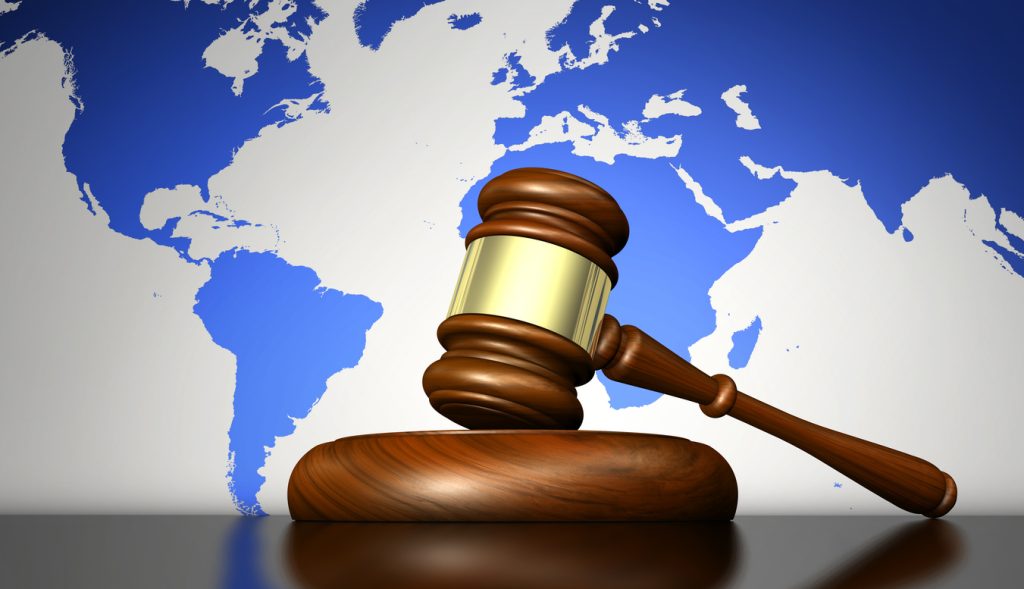Legal and international relations theorists are often puzzled. They come face to face with empirical realities that are complex and contradictory, imbued with double standards and differing courses of action, although the cases can be very similar and involve violation of international humanitarian law. Thus, they soon come to realise that power, not law, is the element that governs social and political relations. Some examples in the European theatre will suffice to demonstrate this.
In March 2022, the International Court of Justice (ICJ), which is attached to the UN and handles cases involving states – the International Criminal Court (ICC) being a different Court based on the “Statute of Rome” of 1998, and dealing with crimes by individuals – issued a sharp warning against Russia’s invasion of Ukraine. It ruled that Russia should immediately stop military operations and restore the legal border between itself and Ukraine. President Biden and State Department officials were outspoken in defending Ukraine’s rights and condemning the invasion as an act of aggression against international law. Yet when, on 24 May 2024, the same Court produced a similar order asking Israel to comply with its obligation under the Genocide Convention and immediately halt its offensive in Rafah, United States officials and Biden himself remained silent. The official position of the United States on the matter is that “Israel’s incursion of Rafah has been a limited operation to root out remaining Hamas fighters, while avoiding undue civilian harm and to free around 100 living and dead Israeli hostages” (U.S. silent as global condemnation of Israel’s Rafah offensive grows - The Washington Post). Clearly, this is Israel’s position adopted by the United States in its entirety.
In July 1974 the island of Cyprus was brusquely divided into two parts. Turkey, the invader, forced partition and population exchange. The Greek Cypriots (about 167,000) were forced to move to the South and the Turkish Cypriots, initially held in the British military bases there, were uprooted to the North, where Turkey installed a puppet regime. The Republic of Cyprus, founded in 1960, is a member of the UN, although its independence depended on a colonial “Treaty of Guarantee” that contravened the UN Charter (Cyprus: A Modern History | Request PDF (researchgate.net)). But Turkey’s invasion was illegal both from the point of view of the UN Charter and the “Treaty of Guarantee”. This is because the treaty stipulated that the three “guaranteeing powers” had the right to intervene, but only in order to restore the status quo ante, that is the legitimate government of the Republic of Cyprus. Turkey did not do that. Instead, it turned the northern third of the island into a security zone, disappointed the Turkish Cypriots, many of whom migrated abroad, mostly to the UK, and transferred settlers from mainland Turkey, placing them in the abandoned houses of Greek Cypriots. Neither the United States nor Britain, a guarantor power, moved to stop the illegal Turkish invasion, turning a blind eye to Turkey’s actions. Today, the issue appears to have been swept under the carpet, especially since the remaining two thirds of the island, the truncated Republic of Cyprus, is a member of the EU and the Eurozone. However, from the point of view of international law, it remains an issue of illegal invasion and occupation, as Turkey forcibly uprooted over 200,000 Cypriots, both Turkish and Greek Cypriots.
Similar arguments have been advanced by legal experts as regards the bombing of Belgrade by NATO from March to June 1999, ostensibly on humanitarian grounds, whereas Israel and Turkey go unpunished for their respective maltreatment of Palestinians and Kurds. The list is long. There are, of course, counter-arguments. Putin – and not only – argues that he had warned the West that any expansion of NATO into Ukraine would be met by force. Turkey maintains that her intervention was necessitated by the Greek junta’s coup against the legitimate government of Archbishop Makarios and that Greece should be grateful as it was her Cyprus operation that triggered the fall of the junta and the restoration of democracy. And Israel’s current position is that its offensive in Gaza is a response to Hamas’ unprecedented and surprising attack on 7 October 2023. In fact, this was the key argument of the Israeli judge, Aharon Barak, who sits on the 15-member ICJ and voted, together with Ugandan jurist Julia Subutinde, against the decision.
However, Israel’s recent attack on Rafah pushed the goalposts of comparisons further, distancing wider layers of media and public opinion from its point of view. No other conflict, bar confirmed genocidal cases such as that of Rwanda, has shown so much recklessness and disregard of international law on the part of the powerful side, and so much indifference on the part of the key great powers to contain it. The United States, Britain, Germany or the EU as a whole have given no signs of joint or separate action towards enforcing peace on Israel. But both Israeli and Hamas leaders have now been put on the spot by the ICC. Many friendly media sources go as far as to ask whether Israel has a policy of starving the Gazans, since the Rafah and the Philadelphi corridors with Egypt are closed (The ICC arrest request is a fire alarm for Israel. Will it take heed? | Jo-Ann Mort | The Guardian). Israel argues that the corridors/crossings are being used for supplying Hamas with weaponry and funds, but this is a moot point. What matters from a humanitarian and legal perspective is that aid cannot reach the civilians, especially women and children, caught in the cross-fire of the parties in conflict. Moreover, the conflict is deeply asymmetrical. The Israeli Defence Force (IDF) boasts one of the best-trained and best (technologically) equipped armed forces in the world. Hamas’ weaponry is elementary. A new peace process initiated by Egypt, Qatar and the United States has stalled. At the moment, the Europeans seem to be busy with the Euro-elections of 9 June, whereas in Britain the public debate seems to have shifted to the forthcoming general election of 4 July. But the landscape in the United States is different. Paradoxically, American civil society is vastly more energetic in condemning Israel’s war in Gaza than in Europe or the UK. Thus, President Biden may have a chance to be re-elected if he rectifies his position on the conflict (Opinion | In Gaza, Biden Gets the Chance to Do the Right Thing - The New York Times (nytimes.com)).
International law is increasingly being seen as a dependent and subordinate variable of power-politics. It is used at convenience in order to justify action on somebody and inaction on somebody else. Thus, whereas the law seems to be an ideal close to perfection, in real life there are double standards. This being the case, the situation in Gaza has taken a dramatic turn and exceeds many similar situations in the past. One of the greatest German-Jewish philosophers of the 20th century put it as follows: “only the law that is studied and no longer practiced is the gateway to justice” (Walter Benjamin).





















